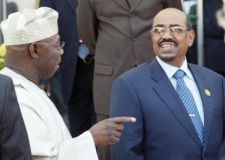African presidents to push for Darfur talks breakthrough
ABUJA, April 4 (Reuters) – African heads of state will push the warring parties from Sudan’s Darfur region to clinch a peace agreement at a meeting on April 8 that all sides said on Tuesday could help break the deadlock.
 Congo Republic’s President Denis Sassou Nguesso, current chairman of the African Union (AU), Nigerian President Olusegun Obasanjo and AU Commission Chairman Alpha Oumar Konare are due to take part in Saturday’s meeting in the Nigerian capital.
Congo Republic’s President Denis Sassou Nguesso, current chairman of the African Union (AU), Nigerian President Olusegun Obasanjo and AU Commission Chairman Alpha Oumar Konare are due to take part in Saturday’s meeting in the Nigerian capital.
The Sudan government delegation said Vice-President Ali Osman Mohamed Taha would also come to Abuja on Saturday in what observers said was perhaps a signal Khartoum would be willing to make new concessions.
“Vice-President Taha would not be coming if the talks hadn’t reached a critical stage … I expect dramatic developments in the next few days,” said a government delegate.
The AU, which is mediating the peace talks and has 7,000 troops monitoring an often-violated ceasefire in Darfur, said the involvement of heads of state could help coax the government and two rebel movements into striking a deal.
“The presence of heads of state at peace negotiations in Africa is a big deal and it usually ends up breaking impasses,” said Berhanu Dinka, who chairs negotiations on power-sharing, one of the three areas under discussion.
The rebel groups took up arms against Khartoum in early 2003 over what they described as neglect and discrimination.
The government backed proxy militias to quell the revolt, according to the rebels, and the ensuing violence killed tens of thousands of people and drove 2 million from their homes into refugee camps inside Darfur and in neighbouring Chad.
The peace talks, in their seventh round and well into their second year, have made slow progress but in Darfur violence has escalated and many parts of the vast desert region are no-go areas for aid workers.
The AU has set a deadline of April 30 for the Abuja talks to yield an agreement. As well as the deal itself, the possibility of sending U.N. troops into Darfur is at stake because Khartoum has said it will consider a transition from an AU to a U.N. force only after a deal is signed.
Delegates from two rebel groups said the diplomatic heavyweights would help give new momentum.
AU mediators said they were trying to resolve the last few sticking points in power-sharing, wealth-sharing and security but needed a political decision from the parties to make peace.
“We are in the last straight line before the finish … We have high hopes of securing an agreement before the 30th,” said Boubou Niang, who chairs the wealth-sharing negotiations.
“What we need now is for the two sides to take courageous political decisions and make concessions,” he added.
